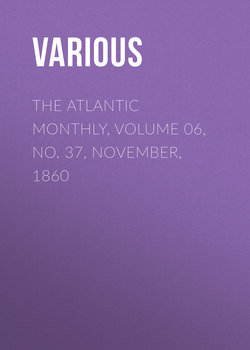The Atlantic Monthly, Volume 06, No. 37, November, 1860

Реклама. ООО «ЛитРес», ИНН: 7719571260.
Оглавление
Various. The Atlantic Monthly, Volume 06, No. 37, November, 1860
THOMAS HOOD
FAYAL AND THE PORTUGUESE
MIDSUMMER AND MAY
I
GONE
EXPRESSION
ITALIAN EXPERIENCES IN COLLECTING "OLD MASTERS."
'TENTY SCRAN'
RECOLLECTIONS OF IRVING
IRENE ANADYOMENE
THE PROFESSOR'S STORY
CHAPTER XXI
CHAPTER XXII
REVIEWS AND LITERARY NOTICES
RECENT AMERICAN PUBLICATIONS
Отрывок из книги
Thomas Hood was originally intended for business, and entered a mercantile house; but the failure of his health, at fifteen years of age, compelled him to leave it, and go to Scotland, where he remained two years, with much gain to his body and his mind. On his return to London, he applied himself to learn the art of engraving; but his constitution would not allow him to pursue it. Yet what he did acquire of this art, with his genius for comic observation, must have been of excellent service to him in his subsequent career. This, at first, was simply literary, in a subordinate connection with "The London Magazine." His relation to this periodical gave him opportunities, which he did not neglect, of knowing many of its brilliant contributors. Among these was Charles Lamb, who took a strong liking to the youthful sub-editor, and, doubtless, discovered a talent that in some points had resemblance to his own. The influence of his conversation and companionship may have brought Hood's natural qualities of mind into early growth, and helped them into early ripeness. Striking as the difference was, in some respects, between them, in other respects the likeness was quite as striking. Both were playful in manner, but melancholy by constitution, and in each there lurked an unsuspected sadness; both had tenderness in their mirth, and mirth in their tenderness; and both were born punsters, with more meaning in their puns than met the ear, and constantly bringing into sudden and surprising revelation the wonderful mysteries of words.
With a genius of so singular a cast, Hood was not destined to continue long a subordinate. Almost with manhood he began to be an independent workman of letters; and as such, through ever-varying gravities and gayeties, tears and laughter, grimsicalities and whimsicalities, prose and verse, he labored incessantly till his too early death. The whole was truly and entirely "Hood's Own." In mind he owed no man anything. Unfortunately, he did in money. That he might economize, and be free to toil in order to pay, he went abroad, residing between four and five years out of England, part of the time at Coblentz, in Rhenish Prussia, and part at Ostend, in Belgium. The climate of Rhenish Prussia was bad for his health, and the people were disagreeable to his feelings. The change to Belgium was at first pleasant and an improvement; but complete recovery soon seemed as far away as ever; nay, it was absolutely away forever. But in the midst of his family—his wife, his little boy and girl, most loving and most loved—bravely he toiled, with pen and pencil, with head and heart; and while men held both their sides from laughter, he who shook them held both his sides from pain; while tears, kindly or comical, came at the touch of his genius into thousands of eyes, eyes were watching and weeping in secret by his bed-side in the lonely night, which, gazing through the cloud of sorrow on his thin features and his uneasy sleep, took note that the instrument was fast decaying which gave forth the enchantment and the charm of all this mirthful and melancholy music. Thus, in bodily pain, in bodily weakness even worse than pain, in pecuniary embarrassment worse than either, worst of all, often distressed in mind as to means of support for his family, he still persevered; his genius did not forsake him, nor did his goodness; the milk of human kindness did not grow sour, nor the sweet charities of human life turn into bitter irritations. But what a tragedy the whole suggests, in its combination of gayety with grief, and in the thought of laughter that must be created at the cost of sighs, of merriment in which every grin has been purchased by a groan!
.....
"Why, the mischief, Fizzle," said Dizzle, "did you say in your farewell-sermon, that it was just as well to preach to the dead buried six feet under the earth as to the people of Drowsytown?"
"I?—I?—I?" gasped the astonished Fizzle. "A more alive and wakeful people are not upon the earth than the citizens of Drowsytown. What calumniator has thus outraged them and me? Who told you this? Who dared to say it?"
.....